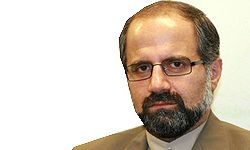Iran’s Deputy Envoy to UN: Iran Ready to Mediate in Syrian Unrest

Iran’s Deputy Ambassador to the UN Eshaq Al-e-Habib said Tehran is ready to mediate between the Syrian government and the armed opposition to resolve the crisis in the Arab country.
In an address to the 193-member United Nations General Assembly in New York on Tuesday, Al-e-Habib expressed the country’s support for the new UN-Arab League special envoy to Syria Lakhdar Brahimi.
“We are pleased to see him take up the new position. Considering his high reputation and broad experience in addressing some issues of sensitive nature before, we are confident that he would also rigorously pursue the goal of finding a comprehensive peaceful political settlement to the Syrian crisis,” Al-e-Habib said according to Press TV.
“The Islamic Republic of Iran is ready to work with him closely… to contribute to the resolution of the ongoing crisis. We support any constructive, unbiased, impartial, and peaceful Syrian-led political process and we stand ready to play our constructive role in that process,” the Iranian deputy ambassador added.
He went on to say that “the broader political reconciliation as well as the national unity, integrity, and stability of Syria will be maintained” only through a Syrian-led peaceful resolution to the unrest in the country.
Al-e-Habib censured the countries which he said are maliciously seeking to topple the government of Syrian President Bashar al-Assad by financing and arming insurgents in the country.
Lakhdar Brahimi also briefly addressed the UN General Assembly on Tuesday.
“The death toll is staggering, the destruction is reaching catastrophic proportions and the suffering is immense,” Brahimi said.
He added, “I am looking forward to my visit to Damascus in a few days time, and… to all the countries that are in a position to help the Syrian-led political process become a reality.”
Meanwhile, the UN Secretary General Ban Ki-moon said that the countries supplying arms to Syria are only increasing the misery in the country.
“This conflict has taken a particularly brutal turn. The continuing militarization of the conflict is deeply tragic and highly dangerous,” Ban told the assembly on the same day.
He said there had to be a greater international effort to end the conflict in Syria and the humanitarian and refugee crisis in and around the country.
Earlier on Tuesday, Syria’s ambassador to the UN said that Damascus is “open-minded and fully committed to the mission of Mr. Brahimi in his endeavors to put an end to violence and find a Syrian-led political solution to the crisis.”
Syrian President Bashar al-Assad said on August 1 that the country is engaged in a crucial and heroic battle that will determine the destiny of the nation.
In October, calm was eventually restored in the Arab state after President Assad started a reform initiative in the country, but Israel, the US and its Arab allies are seeking hard to bring the country into chaos through any possible means. Tel Aviv, Washington and some Arab capitals have been staging various plots in the hope of stirring unrests in Syria once again.
The US and its western and regional allies have long sought to topple Bashar al-Assad and his ruling system. Media reports said that the Syrian rebels and terrorist groups have received significantly more and better weapons in recent weeks, a crime paid for by the Persian Gulf Arab states and coordinated by the United States.
The US daily, Washington Post, reported in May that the Syrian rebels and terrorist groups battling the President Bashar al-Assad’s government have received significantly more and better weapons in recent weeks, a crime paid for by the Persian Gulf Arab states and coordinated by the United States.
The newspaper, quoting opposition activists and US and foreign officials, reported that Obama administration officials emphasized the administration has expanded contacts with opposition military forces to provide the Persian Gulf nations with assessments of rebel credibility and command-and-control infrastructure.
Opposition activists who several months ago said the rebels were running out of ammunition said in May that the flow of weapons – most bought on the black market in neighboring countries or from elements of the Syrian military in the past – has significantly increased after a decision by Saudi Arabia, Qatar and other Persian Gulf states to provide millions of dollars in funding each month.







